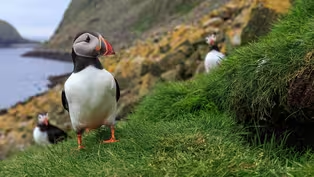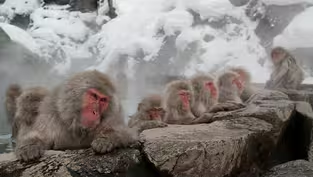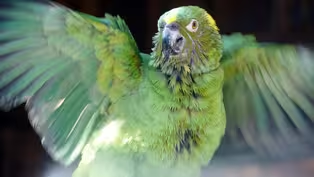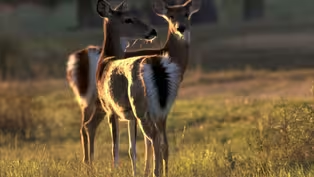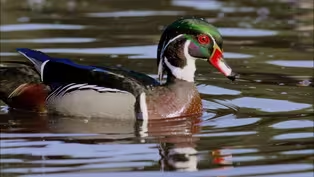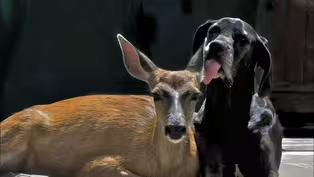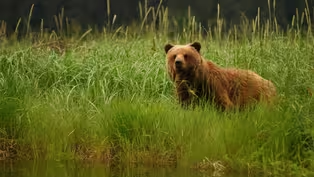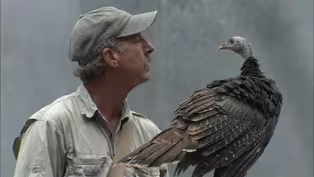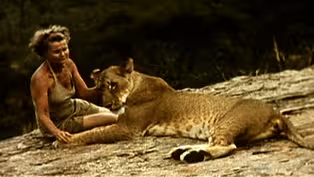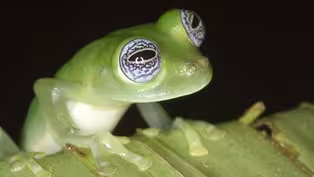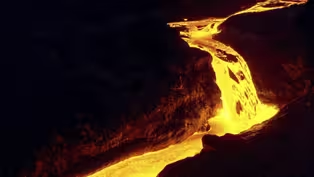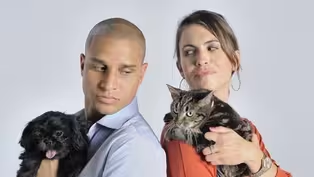
Peacock’s War
Season 8 Episode 3 | 55m 50sVideo has Closed Captions
Doug Peacock, wildlife and his conservation crusade.
Former Vietnam medic Doug Peacock lives as a firewatcher and conservationist in Montana's Glacier National Park.
Problems playing video? | Closed Captioning Feedback
Problems playing video? | Closed Captioning Feedback
Major support for NATURE is provided by The Arnhold Family in memory of Henry and Clarisse Arnhold, Sue and Edgar Wachenheim III, The Fairweather Foundation, Charles Rosenblum, Kathy Chiao and...

Peacock’s War
Season 8 Episode 3 | 55m 50sVideo has Closed Captions
Former Vietnam medic Doug Peacock lives as a firewatcher and conservationist in Montana's Glacier National Park.
Problems playing video? | Closed Captioning Feedback
How to Watch Nature
Nature is available to stream on pbs.org and the free PBS App, available on iPhone, Apple TV, Android TV, Android smartphones, Amazon Fire TV, Amazon Fire Tablet, Roku, Samsung Smart TV, and Vizio.
Buy Now
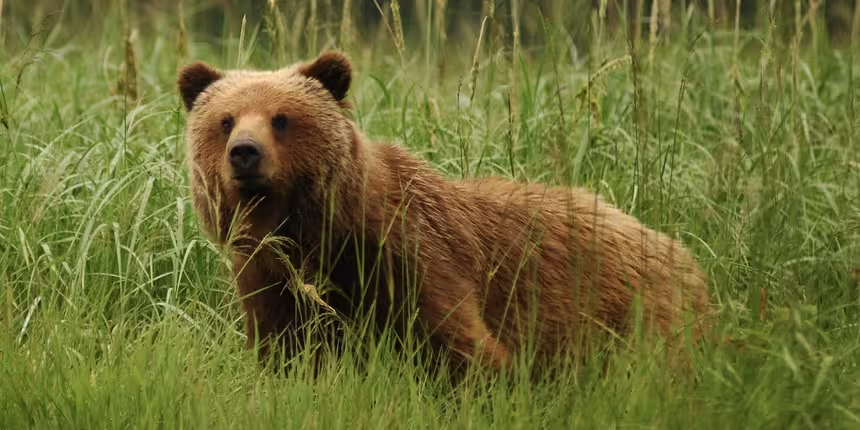
Explore More Ways to Watch
Bring the beauty and wonders of wildlife and natural history into your home with classic NATURE episodes.Providing Support for PBS.org
Learn Moreabout PBS online sponsorshipMore from This Collection
Video has Closed Captions
Animals congregate in huge colonies partly out of necessity and partly for the security. (52m 55s)
Video has Closed Captions
Follow a troop of snow monkeys in Japan to see how they prepare to face the world. (52m 58s)
Video has Closed Captions
Parrots and the bittersweet world they share with humans. (53m 10s)
Video has Closed Captions
Learning about one of our closest neighbors: the white-tailed deer. (53m 10s)
Video has Closed Captions
Take a fascinating look at one of our most familiar birds. (1h 42s)
Video has Closed Captions
Love apparently knows no boundaries in the animal kingdom. (53m 20s)
Video has Closed Captions
Enter a world shaped by bears, trees, and salmon. (50m 9s)
Video has Closed Captions
One man's remarkable experience of raising a group of wild turkey hatchlings to adulthood. (58m 51s)
Elsa's Legacy: The Born Free Story
Video has Closed Captions
The true story that inspired "Born Free". (53m 10s)
Video has Closed Captions
It is the greatest mass extinction since the dinosaurs. (53m 43s)
Video has Closed Captions
Kilauea, on Hawaii's Big Island, is the world's most active volcano. (54m 6s)
Video has Closed Captions
Relationships with cats and dogs are some of the longest and most intimate of our lives. (53m 30s)
Providing Support for PBS.org
Learn Moreabout PBS online sponsorship- [Douglas] Once you go into a grizzly country, you are automatically entering a system where man is not the dominant animal.
You don't have the option of blowing the bear away, and therefore, you have to deal with the bear.
[helicopter whirring] If we wanna have that great bear out there, I think we have to accept him just as he is, with all his cantankerousness, with that indomitable quality about him.
[light dramatic music] - This is grizzly bear country in late summer.
A high windswept mountain meadow in Glacier National Park.
It's also about as far away as you can get from Vietnam, and that war of 20 years ago.
Hi, I'm George Page for Nature.
And ironically, there is a connection between this place and the war, because a Vietnam veteran, named Douglas Peacock, has devoted most of his life, since the war, to saving the dwindling population of grizzlies, one of the world's largest carnivores.
After being traumatized by the Vietnam War, Peacock found a measure of peace in his private war to save the great grizzly's habitat, out here in our magnificent Northwest.
This is a very special film for me, personally.
I can identify with Doug Peacock because I spent a year in Vietnam at the height of the war, not as a soldier, like him, but as a reporter.
And there is much I saw I'd just as soon forget.
So I like being here in what's left of our great wilderness, just knowing there are grizzlies far away from Vietnam.
[eerie music] - [Douglas] I came back in 1968 after the Tet Offensive.
But I got to a lot of places in Vietnam before the war did, and it wasn't a terrible place.
I loved the people, I loved the country.
It was wonderful country.
There were tigers there, there were deer there.
I was a medic, and was under the illusion, at least, that I was doing some good along the way.
But after the Tet Offensive, it was all together too much.
I was a real basket case when I got out of there.
[gentle music] I started filming grizzlies in 1975, full time.
That meant I had to move to either Glacier or Yellowstone National Parks, essentially, because those are the only places that had any bears left.
[gentle music] I came up here late in September, from the North Cascades, and I walked up to the Apgar Mountains, and I stood on the top of the highest peak there.
I counted 14 grizzly bears, and I looked off at the distance and there on the top of the mountain was a fire lookout.
So the next year, I put in one application for one job in the whole world, and it happened to be Huckleberry Lookout, and they were stupid enough to give it to me.
[gentle music] I'm not out to take the greatest chances that I can take, I'm simply out to finish this project with the grizzlies.
It's a great hunk of my life, and I'm close to wrapping it up, in some way.
But that involves an element of risk.
[gentle music] My dreams are filled with dangerous encounters with bears.
Sometimes the bears are ferocious and even a little unnatural.
It's curious, but it's also very practical.
I work out all my fears in my dreams, and then when I get out there in the real world, I don't have to bother with them much.
Couple times a week, sometimes, I'll dream of bears.
[gentle music] The grizzly, especially among the Plains Indians, was always something more than a bear.
A symbol more than anything else, of courage, of power.
A sort of awesome being who was sent down on earth to humble men, to make men humble.
[eerie music] I have a relationship with this one bear.
I'm very drawn to the bear, he's my most important grizzly bear, but he's also the most dangerous animal I know, and he's the one that keeps destroying my gear.
He's the one that ate my T-shirt, for example.
He's the one that ate my sleeping bag.
He's the one that, essentially, chewed to pieces everything that smelled of me, while ignoring lots of other things.
And the quintessence of the grizzly year for me, comes when I go out and I see this one animal.
Some years I don't film him, but I make sure he's there.
If I ever get mauled, or seriously hurt, or killed by a grizzly, it'll probably be by him.
And yet, the high point of my year comes when I find him.
[gentle music] I could be incredibly hypocritical, for me to go out and pretend that I'm making a film that's gonna benefit and help grizzlies, and invade the last territory, the last few bears we've got left here, and also carry a big piece, just so if things don't go just so-so, it's not my turf, blow 'em away with a .44 Magnum.
I don't think that'd be...
I think that'd be poor manners.
You don't have the option of blowing the bear away, and therefore, you have to deal with the bear.
And that teaches you a lot, you learn a lot about bears.
You learn a lot about yourself by having to stare down grizzlies.
[door creaking] [water pouring] I always thought I was too active to take a job as a fire lookout, but it turns out it was a perfect job.
It's just contemplative enough to suit my needs.
I get a lot of reading and writing done.
You get to look down on the backs of bears and eagles.
And if you like your own company, it's like getting thrown into the briar patch, you know.
You're surrounded by grizzly bears.
In past years, they had a lot of trouble.
They had a lot of trouble with people that didn't like bears applying for jobs as fire lookouts.
And the lookouts would often quit and leave because they were afraid of bears.
Go back to Chicago.
[gentle music] Mostly it was the quiet.
Once the radio got turned off, there was nothing making a sound for 20 miles in any one direction.
And at night you could see no lights.
You could see the lights of Kalispell and Columbia Falls, maybe 30 miles away, but you'd look out, and one side of the lookout was dark as far as the eye could see.
And all that space is really the stronghold of wilderness that's left in the lower 48.
It's the stronghold of the last grizzlies, anyway.
And all that darkness, that meant a lot to me.
Just having that blank spot on a map.
An absolute void of any human activity, whatsoever.
[gentle music] [train rumbling] [train whistle blowing] Hi, Jane?
- Yeah.
- I'm Peacock.
- Peacock.
- Welcome to Montana.
This way, I got my pickup, it wouldn't start.
Sorry I was late.
[Douglas speaking indistinctly] You gotta open these doors one at a time, my windshield- - [Jane] Oh, sorry.
- That's okay, go ahead and get out.
My windshield wiper.
Hi, hon.
- [Lisa] Hi.
- [Jane] Hi.
- [Douglas] This is Jane Williams, from New York.
- Hi, Jane.
- [Douglas] She's interested in writing about grizzly bears.
And I'm gonna take her up the mountain, someplace.
- Who's this?
- [Lisa] This is Laurel.
- This is Laurel Louise.
- What are you doin'?
So this is home, eh?
- Yep.
- It's quite a snug home.
[Lisa laughs] - Come on in.
- Okay.
- I bought it dead drunk in a bar in Tucson for 400 bucks.
- And you're still living in it, right?
- So look here, this is where I ran into an irrigation ditch out of Santa Fe, one night.
- Were you drunk then, too?
- No, no.
Lisa was up at the Grizzly Hilton when she was eight and a half months pregnant.
And I thought she was seven and a half months pregnant.
I mean, I almost blew it altogether.
We were gonna have Laurel with a midwife and a little birthing room.
We never made it, we had her on the road.
- [Jane] No kidding!
- No, we went outta here and one day later, bounce, bounce, bounce.
Here it comes, I'm reading the books.
I'm already... - [Jane] Up at the Grizzly Hilton?
- [Lisa] No, no, no, we got down- - No, we got down from the Grizzly Hilton, but bouncing on the road from here to Great Falls, brought on labor, and I'm still on month six, you know, trying to figure out what's going on there.
We invented some last minute breathing exercises, and they seemed to work, and that's what we got.
- [Lisa] Yeah.
- When was she born?
- [Douglas] On the 7th of October, my favorite time of year.
- Libra.
- [Lisa] Is that what she is?
- I think so.
- [Douglas] As long as she doesn't have my horoscope, I don't care.
- What is your horoscope?
- [Douglas] It's all bad.
Apparently- - You mentioned your horoscope several times.
- It's something one would prefer not to have as far, as I can tell.
- [Jane] What is it?
- Well, I had...
This woman worked it out for me once, and she came to tell another woman, who was a friend of mine, about my horoscope, and she broke down in tears, and sobbed, "I'm sorry, I'm sorry."
And I never found out the particulars, but it's, like I say, it's something one would prefer not to have, I think.
- [Jane] When was the first time you ever saw grizzly close up?
- Well, it was in Alaska, and I was a punk kid packing a .44 Magnum on my hip.
And we were hiking across some sort of open country.
And all of a sudden, at about 100 yards away, a grizzly sees us, stands up, and immediately just charges.
Doesn't hesitate, nothing.
I take my 44 mag out, and I've got 'em all ready to go.
And I've been reading all these horror stories about grizz, and all these macho books, and talked to all kinds of hunters.
And I knew after about two seconds I wasn't gonna shoot the bear anyway, you know?
- Did the bear keep coming?
- The bear kept coming, up to about 15 feet away, then it sort of lifted up its front paws.
Not really a rear, but sort of lifted up, [sniff] caught our scent, and veered, and ran away just as fast.
After that, I quit carrying guns in grizz country.
- [Jane] Well, what would you do if a bear charged you?
- You gotta stand your ground, because there's nothing else you can do up there.
There's no trees to climb.
- [Jane] Oh, there aren't?
- No, and bear do this to each other all the time.
Most charges are bluffs.
Of course, you never know until it happens.
But if you stand your ground, the odds are the bear will stop, and veer, turn off.
- You think that the people that are killed by bears, that happens because they try to run away?
Or they try to... - Well, that's where a lot of people get hurt, because they move too quick when they should be standing their ground, and they trigger the predator instinct, because grizzlies are predators, part of the year, and part of that instinct is there.
So if you get charged by a sow with cubs, and she's only 40 feet away, and you make a move for a tree, she's likely to conclude that charge.
But if you stand there and just stand your ground like another dominant bear, 99 times out of a hundred, she won't.
- Should you have your arms out?
- I guess I do, because I think it makes you look a little larger, that's all.
[wood banging] - What is this supposed to... Is this supposed to help, or what?
- Yeah, this just, I think this helps.
Smoke is a natural scent.
And they just don't pick up on other smells as much if you smoke your clothes, I think it sort of hides or camouflages your human scent, which is the main thing bears key off of.
They key off movement.
Their hearing is a lot better than ours, but their nose is just unparalleled in the animal kingdom.
They can smell a human being a mile away.
That's true.
- Well, what happens if we're out there, sleeping, and a bear comes along?
- We gotta hear the bear coming.
- [Jane] You can hear the bear coming?
- Yeah, he makes a lot of noise, too.
- [Jane] And then you climb a tree?
- No, I usually make a little noise, and talk to him, and it keeps him at bay.
But he's a dominant bear, and he never runs away very far.
So all we can do is, if we hear something out there in the brush, I'll wake up, and I'll get up, and I'll walk around, and I'll talk to this animal.
Try to keep a fire going most of the night.
It's not a time of year when you can get much sleep up there.
[Douglas laughs] - Well, I don't know if I wanna stay up there tonight.
[laughs] - I don't blame ya.
Neither do I.
- Well, I hope you're willing to stand my ground for grizzlies.
- We'll be okay, honest.
It's just gonna be a sort of tense night.
Maybe a sleepless night, that's all.
We'll make up for it later.
And I think it could be beautiful tomorrow, if it snows.
It's better to have snow than rain.
Rain is miserable up there... [soft music] - [whispering] See that large fir tree over there?
The very largest one.
- [whispering] Right there?
- Yeah.
- Yeah.
- Okay, now look right over the top of it.
Just over the top of it, about 10 feet.
You'll see there's three bears.
Two of 'em are kind blocked.
- I see it.
- Okay, got 'em, those are grizzlies.
There's two yearlings that are sort of banded colored, and the mother's quite brown.
- [Jane] I don't see the mother.
- [Douglas] Okay, she's brown.
Just keep looking in the area.
There-- - Yeah, now I can see them.
Right there.
- Yep, you can see her moving.
That's great.
They're actually, they're one and half years old, so they're yearlings.
- Now there's three.
- There's three altogether.
The brown sow, and the two light yearlings.
- I see three light ones.
- Oh, do you?
- Yeah.
- Oh my God, there's three of them.
- [Jane] Unless the mother has some white on the... - [Douglas] Oh, well, you know, it's possible there's three.
I've just, all I've seen is two so far.
The two yearlings are out to the right, and the mother's to the left.
- [Jane] Yeah, it was the mother I saw.
- [Douglas] Those are your grizzly bears.
There is a beautiful family.
[gentle music] It's a really gorgeous family.
Hi, grizzly bears.
I'm really glad there's some still around.
I wasn't sure there'd be any left.
[gentle music] - [Jane] They're beautiful.
- [Douglas] They're so playful.
Look at the two cubs go at each other.
[tense music] Oh God, they did hear us.
- [Jane] Are they coming up on this ridge.
Okay, they're coming up over the ridge.
- [Douglas] No, they're not.
- [Jane] They're coming up here.
- No.
They don't know where here, but they did hear us.
They came and smelled us.
The way they identify human beings is with their nose, usually.
I think we just stay here until we see what they're gonna do.
- [Jane] There's another one.
- Okay, now watch his confrontation.
I can't see the sow and her cubs anymore.
Once he sees them, he's likely to charge.
Yes, he will try to kill them.
- There's the cubs, do you see that?
On this side of the lake.
Two of them.
- [Douglas] Yeah.
[tense music] - Would he be listening to them?
- Yes, that's what spooked him.
It wasn't us.
[tense music] That's a lot of drama, isn't it?
It's really a tense time of year.
It looks like it's gonna snow tonight.
- [Jane] There, he's going down to the water.
- Yeah.
The wind is rising.
It means that front is coming in.
[light dramatic music] [helicopter whirring] [dramatic music] [helicopter whirring] [helicopter and music fading] - [Jane] [whispering] Will he be back?
- What?
- [Jane] Is he coming back?
- No, I think that's another sound.
I don't think he'll be back tonight.
He was on his way out, and he just comes through here just to bother the bears.
But for me, there's hardly a greater evil than a helicopter.
It all goes back every time I see one, I have that same feeling when they were machine gunning me in Vietnam.
- [Jane] What helicopter was doing that?
- That was one of our helicopters, there.
- [Jane] One of our helicopters?
- Sure, they shoot at anything up there.
- [Jane] They were just shooting because you were moving?
- Yeah, because I was something to shoot at.
They don't... Those boys up there don't care.
Throw their tumbling dumb-dumbs at all kinds of things.
Montagnard babies, water buffalo, Green Beret medics, all the same.
And I get that feeling any time I see a helicopter.
The one place I hate, most of all, to see a helicopter is in wilderness, in a wild place, like this.
And if I were armed, I'd probably shoot at the son of a bitch.
I'd probably try to shoot him down.
It's something I-- - [Jane] It's almost an automatic reaction to the sound of the blade.
- It's visceral.
Look at me, I'm shaking right now.
[somber music] I was in the hospital in Da Nang, during the Tet Offensive, I'd extended my tour twice.
They should have gotten me out of country about two months before I actually left.
By the time I got back out to the countryside, the Tet Offenses started to catch up with the countryside.
They came back from cities, and they hit the outline areas.
I watched everything that I'd really, really tried to do, which is build dispensaries and hospitals, rebuild a couple villages.
Everything was burnt to the ground, everything was level.
Unfortunately, a sergeant got ahold of the radio when I wasn't around to stop him.
Called in airstrikes on the VC, who were hurting villagers across the river, and they killed a couple hundred civilians.
They were, you know, they were all women, and children, and old men.
So I sat there and pieced together bodies for four days.
And after four days, I didn't have anything left.
The craziness.
I was out of the country within 48 hours.
[gentle music] My mother picked me up at this little airport in the middle of all these corn fields, and started to drive me back home.
And the first thing I remember is I hadn't gone that fast in two years.
She was driving probably 50 miles an hour, and I was terrified.
I was holding onto the dashboard.
I made her drive 30 miles an hour all the way home.
That was my first recollection.
I guess I didn't have much to say to anybody.
I couldn't really talk to anybody.
- [Jane] Do you remember your first conversation with your father after you got back?
- I just gave him a hug.
We didn't...
I couldn't say anything.
I was a wreck.
He was just really overpowered to see me home.
I went a couple years without a serious conversation with anybody, in a way.
If it wasn't life or death anymore, it no longer concerned me.
I was a real marginal part of the human race, right then.
That's when I first started hanging out with grizzly bears in Yellowstone.
[soft music] - [Jane] So the therapy that worked for you was to be in the mountains.
- To go back out, and crawl back into the brush.
It's just something that works for me.
It helps if I have other things around, like grizzly bears, that force you to take a less myopic view of yourself.
You can't take yourself too seriously being confronted with big bears.
Self-indulgence is just totally impossible in grizzly country.
[light dramatic music] [suspenseful music] Oh, Christ.
That's him.
That's him, no question.
- [Jane] Look at him.
- [Douglas] He's a big, he's a stocky bear.
He's a funny looking bear.
And he's very dark.
You can see it now, when his fur gets wet, he's especially dark.
- Yeah.
- But he's my Moby Dick grizzly.
He's the one that I come to see every year.
As soon as I see him, I usually leave.
- [Jane] Why is this bear special to you?
I mean, why is this the Moby Dick bear?
- [Douglas] I backed him off a ridge one time, and he let me by.
He didn't have to do that.
But then, he came back and served notice on me by eating my T-shirt and sleeping bag.
So he's obviously got a relationship with me.
He doesn't especially want me around, but he tolerates me part of the time.
[suspenseful music] - He's very still, is he listening to us?
- Mm-hmm, he's listening.
[suspenseful music] - [Jane] You think he really knows you individually?
- Yeah, I think he does.
- Separate from other human beings.
- [Douglas] I don't know if he knows any other human beings, but I think he knows me.
- [Jane] Oh.
- [Douglas] Life is just a little better when he's around.
- [Jane] Life is a little better?
- [Douglas] Yeah, it is.
He makes my life a lot more insecure, but much more interesting.
That bear might come up and nose around, and I dunno what he'd do.
- [Jane] [whispering] You're afraid he'll come up tonight?
- [Douglas] If he knows we're here, he might.
He did one time.
- You said that you backed that bear off a ridge, and that was the night the bear-- - The bear allowed me to pass.
- [Jane] The bear allowed you to pass.
- Mm-hmm.
- [Jane] But then, that night was the night-- - All night long, I got back up to the top, I knew I was gonna see that bear again, so I built a little tiny fire right on the top.
Within 20 minutes, I could hear a crunch, crunch, crunch.
Crunch, crunch, crunch, here comes this big bear.
I get the fire burning a little bit.
I take some beargrass plumes, which don't burn very well, lace 'em with toilet paper, get 'em burning like a torch, walk off to the side of the hill, and say, "Hey, grizzly bear, why don't you back off a little bit?"
Or something like that, and the bear does.
But then, 20 minutes later, on another side of the mountain, and here he comes again.
Crunch, crunch, crunch, crunch, crunch.
I get more beargrass burning, go off.
He does this til two in the morning.
At two in the morning, he finally leaves me alone, and I go to sleep.
- [Jane] You were able to sleep?
- I was so tired.
[tent rustling] - This way?
- [Douglas] No, the brown part goes down.
How's that?
- [Jane] Perfect.
- Just put the rain fly on, before it rains any harder.
- [Jane] The Grizzly Hilton rises again.
- Yes, sir.
[tent rustling] - Well, I just hope that bear realizes that it's your personal fight, you know?
No one else involved.
- [Douglas] It has nothin' to do with you.
[Jane laughing] [eerie music] - [Jane] I don't know, I just...
I keep having this image of a big claw coming through the roof.
You know, I just can't sleep.
I mean, if you're in a tent and you hear the bear, you probably hear the bear from pretty far away, walking, don't you?
- [Douglas] On a calm night, they make a lot of noise.
Yeah.
- [Jane] Can you hear them breathing?
- [Douglas] Well, yeah, but only when they get 10, 15 feet away.
- [Jane] Oh, God.
[deer bleating] [indistinct] [gentle upbeat music] - I think I know this bear.
His name, in 1976, was Happy Bear, and he was a four-year-old.
And he would play by himself for hours at a time.
[gentle upbeat music] That grizzly bear is biting the ice.
He's smashing the ice with his paws now.
Few animals play like the solitary grizzlies, and nobody know they do this.
Oh, isn't that fun?
By God, I wish I were you.
I've seen him every year now, for eight years in a row.
It's hard to believe he's that old.
He's almost my age, bear-wise.
Getting right up there.
One foot in the grave.
[upbeat music] Jump for joy, grizzly bear, jump for joy.
[soft music] - [Jane] [whispering] What was it like?
- There's bear skat all over that snow pool.
Huge bear skat.
- [Jane] Fresh?
- Yeah, and there's a little bear that pranced around it.
That there he was prancing around, it was the biggest bear skat I'd ever seen, and it'd be a huge grizzly.
- Have you ever been down there before?
- No, I don't, that's bear's.
I leave it alone, I don't go down there.
That's the first time.
It's lovely down there, it just doesn't belong to us.
- [Jane] Do you think you'll ever come back here again?
- No, uh-uh.
- Because you went down there?
- Partly.
Partly because I haven't been doing a great job.
My operation isn't as clean as it used to be, and I gotta stop this stuff.
- [Jane] You're bringing too many people?
- Yeah, I haven't been great here, the last few years.
I've been trading off, I've been trying to publicize bears, and I've been coming here more than I should have.
And it's a real delicate balance.
There's no way to know when you're really treading too heavily.
My feeling is maybe I've treaded too heavily.
and it's time for me to back off.
It's time to say farewell to these bears for a good while.
This is it.
I'll miss this place, though.
Because it's a special place.
[sweeping orchestral music] - If someone that you knew well was hurt by a bear, would it change your feelings at all about grizzlies?
- No.
- Well, suppose it was someone who knew what they were doing.
Who did everything right, who hung up their food, who really knows how to camp?
And despite all their precautions, just some by some freak-- - Well, I think that person would also be aware of the fact that once you go into grizzly country, you are automatically entering a system where man is not the dominant animal.
And in the configuration of things that are really possible out there, is the possibility that a grizzly bear could tear up your camp for no fault of your own, or tear you up.
It's an element of risk, and it's an element that I've struggled very hard to try and protect in wild places, because we don't need our wild places all safe and tame.
We need a few untamed last vestiges that we can go into, and enter the conditions with which our first white ancestors hit this continent four and five hundred years ago.
I think it's something which, by it's very definition, is uncontrollable.
I think it's unmanageable.
I think it's uncompromisable wilderness, and there's nothing we can do.
If we want to have that great bear out there, I think we have to accept him just as he is, with all his cantankerousness, with that indomitable quality about him.
And we can't have the bear on our terms.
He's not going to be non-aggressive, he's not gonna be shy.
He's gonna be exactly what he is, which is a risky proposition.
- Wow.
Our last night.
[glasses clink] - Here's to the end of our ordered year, our ordered life.
Is that Laurel's wine?
- It's not Laurel's wine, but it's a nice little wine.
[Lisa speaks quietly to child] Want to go to Arizona?
- Yeah, down where it's warm.
- Mm-hmm.
- See all the friends we didn't get to see last winter.
[baby babbling] Last nights are always sad.
- I know, it is sad.
- We've had a lot of last nights.
- I'm sorry.
I always get bummed out the last day of my lookout.
I miss this place already.
[hooves clomping] Hey, Stu.
- You ready to go down?
- Sure.
I didn't know if you were coming today.
I just tried to hook up my radio, couldn't get it to work.
I said, my God, you know?
I'm only two weeks late.
- Figured we better get you out before you got snowed in.
- Yeah, you bet.
We've got a real hodgepodge of gear.
I figure we'll just load up until you're full, and go on down.
Okay, now this one ought to be about the same weight.
That's what I'm hoping, 'cause that's a heavy son of a bitch.
- [Lisa] Hi, Stu.
- Did you pack Leonard out there?
- [Stu] Yeah, I took him out last week.
- [Douglas] Has Leonard seen many grizzlies up there, this year?
- Not too many, but he wasn't disappointed.
- [Douglas] No, I know.
I know that.
[Lisa laughing] That's not his favorite thing in the world.
- He said after the helicopter was up there, he didn't see much.
- Hey, that's true with me, too.
I was up there the same day the helicopter was, and boy, they just disappeared in a hurry.
That's something I'm gonna call the park on, this year.
They got no business doing surveys by helicopter.
That just drives the bears just crazy.
Of course, I've been doing these seasonal jobs so bloody long, it's been... - Be hard to work here long, wouldn't it?
- [Douglas] God, it'd be awful.
It's been eight years since I've worked more than six months out of a whole year.
I'm right down to the point now where I consider poor excessive.
[laughs] - [Stu] He told me last year he might have to get a real job.
- [Douglas] Yeah, well, that's true.
I got a little girl to support, you know?
Baby needs new shoes, and all that.
I'm gonna probably wrap it up with bears this year, I think.
- Are ya?
- Yeah, what I'm doing is working on a book.
- Oh, good.
- And if I can an advance on a book, I can live through the winter, and spend the winter writing.
- Yeah.
- So I think I'll go down to Arizona.
Sit down in front of a typewriter and bang away.
I knew it was coming sooner or later.
- [Stu] Oh, it sounds pretty good, man.
[gentle music] [hooves clomping] [conversing in the distance] [gentle music] [engine revving] - [Lisa] We've got an incredible amount of damage in here, Doug.
- [Douglas] Hmm?
- [Lisa] The woodrat's done a lot of damage.
It's eating the carpet, it's broken the picture.
- [Douglas] Oh, damn it.
It'll be taken care of today.
- [Lisa] Look at this.
He knocked over a picture.
He broke a-- - Oh, damn.
Woodrats, they're so much trouble when they're looking for a place to live for the winter, and they're so big.
You're afraid to go to sleep at night, because you know one's gonna run across your face.
- [Lisa] Honey, you can just clean it up a little, too.
- [Douglas] Okay.
[Douglas making animal noises] [baby babbling] Here he comes again, look it.
He's gonna charge all of a sudden.
[Douglas making animal noises] [baby laughing and babbling] Tundra bear mauls much.
- [Lisa] Will you get a screw for this some day?
- [Douglas] Yeah, I will, some day, hon.
[metal clattering] Sorry, woodrat, you need a new home.
What do you think varmints like?
Cheerios or bran?
[engine rumbling and stalling] [engine starting and rumbling] - [Jeffery] Look at the only human being who cannot touch his elbows.
- Howdy.
- Hi.
- Hi, Teal.
- Hi.
- Hey, baby Laurel.
[indistinct] Good, we can touch fingers together, huh?
- We'll get one of our own sticks from the yard.
- [Friend] Yeah, I guess we've done a little work since you were here last.
- Oh, yes, you've gotten lots of friends to pound nails again.
- Uh-huh, uh-huh.
- Come on over to Jeffery's place and pound nails.
- You want to see how clean our windows are?
[Lisa laughing] Rainbow peak.
- Beautiful.
[wood splitting] Not too bright, but split heavy log.
Real man not smart, but strong.
- It's gonna be the most efficient way to do this.
[wood splitting] You work and I supervise?
- Sure.
I love to do this.
I'm no good at it, I have no finesse.
- Yeah, but you can't go too far wrong, either.
[wood splitting] - We had to go out and visit mom and dad in Portland.
We had no money.
And one old friend of my mother's was there, and she said, "Well, Lisa, it's nice to see you."
And, "Where do you live now?"
And I said, "Well, in the winter, we live around Tucson, or as close to the Mexican border as we can get," and in the summer, we go up to Montana," and, you know, live with the grizzly bears."
And she was saying, just in her mouth, it was like, "Oh, however do you manage two homes?"
And my mouth was just open, ready to say, "Oh, well, I trust the help implicitly.
You know, they never steal the sterling."
And then, but she, it was before I could even get the words out, she was like, "Oh," you know, "you live in a tent, right?"
- Ever since I started filming, I've had a certain sense of a last autumn for the bears.
I feel that every time I run that movie camera.
What I'm getting is a historical record.
Essentially, it's a document that's set in the past.
And I know that I'm wrapping up something here, too, after eight years of filming, and I'm done with something.
But also, I'm leaving something behind, which will never be there again.
When I see Teal and little Laurel playing together, and I realize that our two daughters will probably have a chance to grow up on the fringe of what's left of the wild country, south of Canada.
And this is really a question, more than anything else, because I have a feeling that maybe they're gonna be about the last of their generation to see that.
And that's a sad comment.
- All right, well, what's...
I mean, how can you go after it day after day, and think that's the end?
I mean, don't you have some hope down in there?
- Yeah, I've got some hope.
- Really strong.
- I feel that our odds of making it are precisely the same as our ability to give a little bit of grace to those last few bears out there.
And leave the country big enough, just big enough, to support maybe one last grizz.
I feel that, indeed, our odds are precisely the same.
And I feel that that's worth fighting for, that's worth everything.
I mean, what else are we gonna do?
[gentle music] All we got south of Canada, what the American Indian coexisted with for at least 10,000 years of habitat, is a couple of isolated enclaves that still contain the big mega fauna, such as my bears, and the other big carnivores.
And all the rest, we've transformed into human and economic landscapes.
And I think this is a pretty risky proposition, because we all sprang from that habitat, and quite simply, that which evolves doesn't persist, unless the same forces that created it also continue.
To me, these forces include these large animals, who's future existence on Earth is totally dependent upon us now.
[orchestral music] If I didn't have a place to go that felt as wild as country has to be to support a grizzly, I'd go nuts.
I can't imagine living in this world without knowing that place is there somewhere, even if you don't get to it.
When we're 74, one last epic journey into grizz country.
If that's the only trip one ever takes, and it's only in one's mind, it's still good enough.
Look at him.
Hi, grizzly bear.
Look at that grizzly bear, he's got frog-like legs.
[orchestral music] What a magnificent critter.
Thank you, bear.
[gentle music] [upbeat music]

- Science and Nature

Explore scientific discoveries on television's most acclaimed science documentary series.













Support for PBS provided by:
Major support for NATURE is provided by The Arnhold Family in memory of Henry and Clarisse Arnhold, Sue and Edgar Wachenheim III, The Fairweather Foundation, Charles Rosenblum, Kathy Chiao and...
